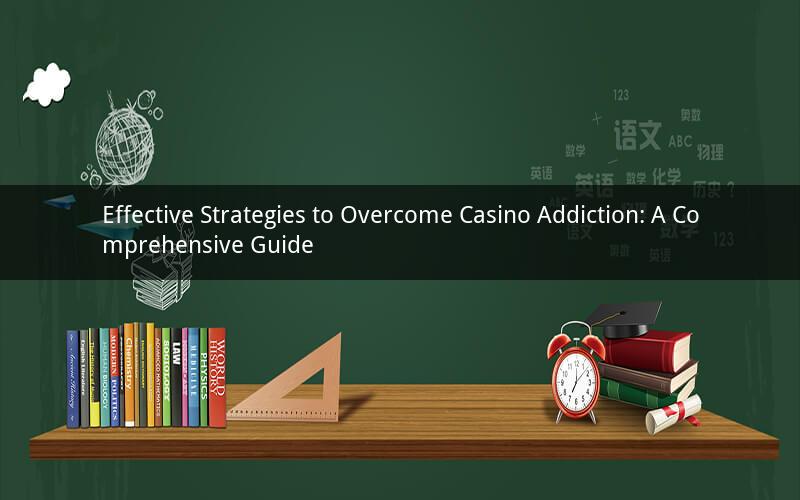
Introduction:
Casino addiction is a serious issue that affects countless individuals worldwide. It can lead to financial, emotional, and social problems. If you or someone you know is struggling with casino addiction, it's crucial to seek help and implement effective strategies to overcome it. This article provides a comprehensive guide on how to get rid of casino addiction, offering various methods and support systems to aid in the recovery process.
1. Understanding Casino Addiction:
To effectively overcome casino addiction, it's essential to understand its nature and causes. Casino addiction, also known as gambling addiction, is characterized by an irresistible urge to gamble, despite negative consequences. It is often rooted in psychological, emotional, or environmental factors. By recognizing the signs and causes, individuals can take the first step towards recovery.
1.1 Signs of Casino Addiction:
- Increased time spent gambling
- Preoccupation with thoughts of gambling
- Needing to gamble more money to achieve the same thrill
- Neglecting responsibilities, relationships, and hobbies
- Feeling restless or irritable when unable to gamble
- Continuing to gamble despite negative consequences
1.2 Causes of Casino Addiction:
- Psychological factors: Low self-esteem, anxiety, depression, and other mental health issues
- Environmental factors: Easy access to casinos, exposure to gambling advertisements, and social pressure
- Genetic factors: Some individuals may have a genetic predisposition to addiction
2. Seeking Professional Help:
Professional help is crucial in overcoming casino addiction. Therapists, counselors, and addiction specialists can provide tailored support and treatment options. Here are some effective methods for seeking professional help:
2.1 Therapy:
- Cognitive-behavioral therapy (CBT): Helps individuals identify and change negative thoughts and behaviors associated with gambling.
- Dialectical behavior therapy (DBT): Focuses on emotional regulation and teaches skills to manage triggers and cravings.
- Family therapy: Involves family members in the recovery process, addressing family dynamics and improving communication.
2.2 Support Groups:
Support groups such as Gamblers Anonymous (GA) provide a safe and supportive environment for individuals struggling with gambling addiction. Sharing experiences and receiving encouragement from others in similar situations can be highly beneficial.
2.3 Inpatient or Residential Treatment:
For severe cases, inpatient or residential treatment programs offer a structured environment to focus on recovery. These programs provide round-the-clock support, therapy, and resources to overcome addiction.
3. Self-Management Techniques:
In addition to seeking professional help, individuals can implement self-management techniques to strengthen their recovery journey:
3.1 Set Clear Boundaries:
Establish strict limits on gambling activities, including time spent gambling, the amount of money wagered, and specific types of games. Stick to these boundaries to prevent relapse.
3.2 Find Alternative Activities:
Engage in healthy and fulfilling activities that provide a sense of accomplishment and distraction from the urge to gamble. Hobbies, exercise, and socializing with non-gambling friends can be effective alternatives.
3.3 Identify Triggers:
Identify situations, emotions, or environments that trigger the urge to gamble. Develop strategies to cope with these triggers, such as avoiding certain places or seeking support when feeling overwhelmed.
3.4 Strengthen Support Networks:
Surround yourself with supportive individuals who understand your struggle and are committed to your recovery. Share your progress and seek their encouragement.
4. Financial Management:
Overcoming casino addiction often requires addressing financial issues resulting from gambling. Here are some steps to manage finances:
4.1 Create a Budget:
Develop a realistic budget that includes essential expenses, savings, and entertainment. Stick to the budget to avoid overspending.
4.2 Seek Financial Counseling:
If financial problems are severe, consider seeking assistance from a financial counselor or credit counselor. They can provide guidance on managing debt, creating a repayment plan, and rebuilding credit.
4.3 Protect Yourself from Future Financial Risks:
Avoid credit cards and loans that may encourage gambling. Consider setting up a gambling block on your bank account to prevent access to gambling websites.
5. Long-Term Recovery:
Overcoming casino addiction is a lifelong journey. Maintaining long-term recovery requires continuous effort and commitment. Here are some tips for sustaining recovery:
5.1 Stay Connected:
Maintain contact with support groups, therapists, and friends who understand your struggle. Regularly attend meetings and seek their support when needed.
5.2 Reflect on Progress:
Regularly reflect on your progress and celebrate milestones. Acknowledge the challenges and setbacks, but focus on the positive changes you have made.
5.3 Practice Self-Care:
Prioritize self-care by maintaining a healthy lifestyle, including proper nutrition, exercise, and adequate sleep. Self-care helps build resilience and enhances overall well-being.
5.4 Continue Education:
Stay informed about gambling addiction and its consequences. Educate yourself on effective coping strategies and stay updated on new research and treatment options.
Questions and Answers:
1. Q: How long does it take to overcome casino addiction?
A: The duration of recovery varies for each individual. Some may experience immediate relief, while others may require ongoing treatment and support for several years.
2. Q: Can I overcome casino addiction on my own?
A: While it is possible to overcome casino addiction without professional help, seeking support from therapists, support groups, and loved ones can significantly improve the recovery process.
3. Q: Will I always be prone to relapse?
A: Relapse is possible, but with proper support and strategies, individuals can minimize the risk of relapse and develop resilience to overcome future challenges.
4. Q: Can therapy alone help overcome casino addiction?
A: Therapy can be a valuable component of recovery, but it is often most effective when combined with other strategies, such as support groups, self-management techniques, and financial management.
5. Q: Is there a cure for casino addiction?
A: There is no definitive cure for casino addiction, but with comprehensive treatment and ongoing commitment, individuals can achieve long-term recovery and lead a fulfilling life.